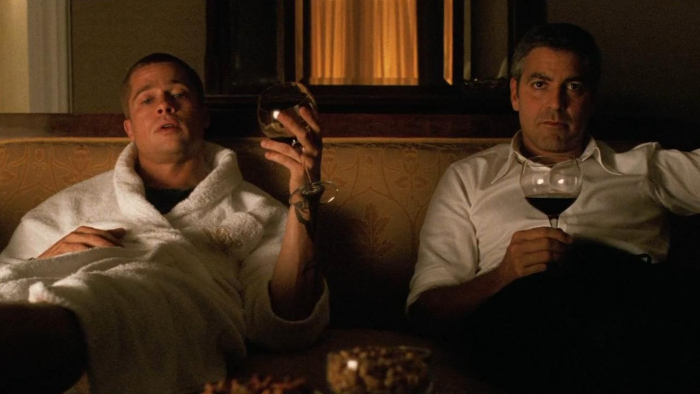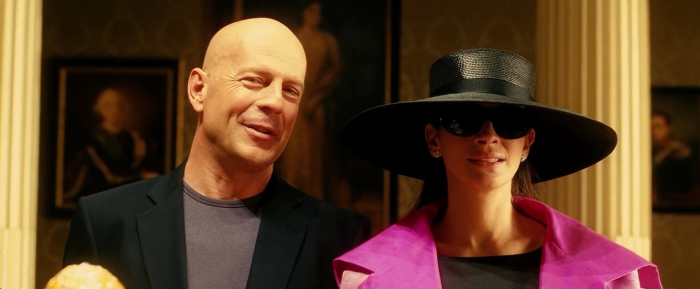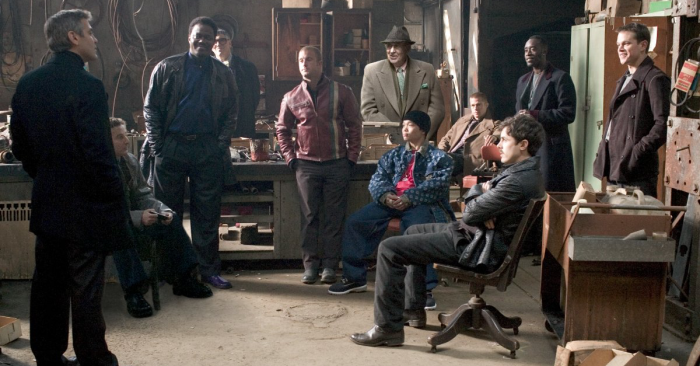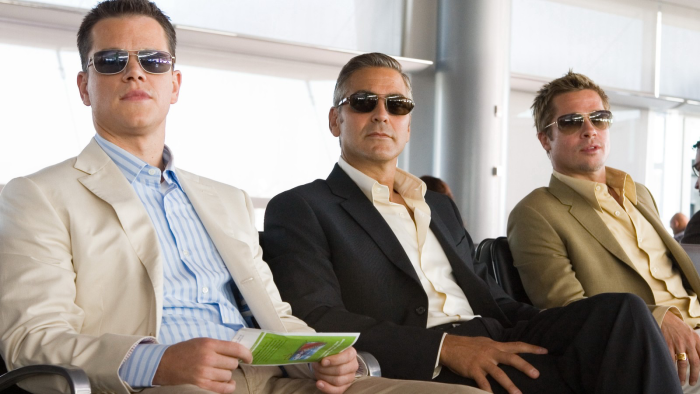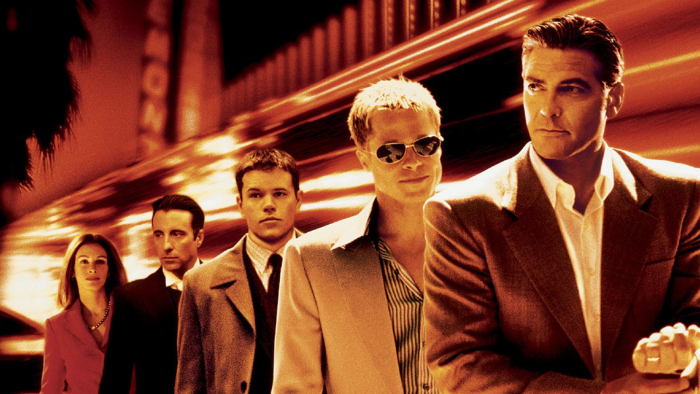The Unpopular Opinion: 'Ocean's Twelve' Is A Vital Piece Of A Perfect Trilogy
(Welcome to The Unpopular Opinion, a series where a writer goes to the defense of a much-maligned film or sets their sights on a movie seemingly beloved by all. In this edition: Ocean's Twelve is a brilliant chapter in what may be the best trilogy mainstream Hollywood has ever produced.)
If sequels are hard to pull off, then trilogies are the hardest of all. Hollywood is overstuffed with franchises, but few of those series are straight-up trilogies, and even fewer of those are good from start to finish. Even the existing trilogies that might be enjoyable have built-in caveats. Like most people, I love the original Star Wars trilogy, but it's not a closed-off trilogy, telling three stories as opposed to being three stories in a larger, more massive series of films. The original trilogy is great, but it's not, in its own way, standalone. Even great mainstream trilogies like the Toy Story films aren't going to be trilogies for much longer, as the fourth Toy Story is on the way in 2019.
This week, as we prepare for the release of Logan Lucky, a new heist film from iconoclastic director Steven Soderbergh, it's time to acknowledge perhaps the best mainstream trilogy of all: the Ocean's trilogy.
Yes, All Three of Them
I've probably lost some of you already, but don't go too far if you're still here.
Most people would probably agree that Soderbergh's 2001 remake of Ocean's Eleven is a great, slick, funny, and exciting piece of entertainment. It's one of the few truly smart remakes, in part because Warner Bros. Pictures was wise enough to remake a movie that wasn't previously beloved by a lot of people. (I don't mean to suggest that the Rat Pack-starring 1960 version of Ocean's 11 is bad, but announcing a remake of that film inspired less anger than if Warner Bros. said they were going to remake Casablanca.)
Ocean's Eleven is one of the great heist movies, twisting and turning until it reaches a wholly satisfying, if expected conclusion. It also started a more familiar narrative surrounding Steven Soderbergh's career, the notion of him embodying the "one for me, one for them" mentality in dealing with studios and his future projects. Ocean's Eleven was a huge hit, which enabled him in 2002 to make two films "for him": a remake of Andrei Tarkovsky's Solaris with George Clooney and the low-budget industry-focused indie Full Frontal. Soon after those films performed weakly financially (though only Solaris would've represented a mild-to-large loss for 20th Century Fox), Soderbergh went back to Warner Bros. to presumably make another one "for them": Ocean's Twelve.
One of the many joys of watching Ocean's Twelve is the realization that it's just as much for Soderbergh – who's previously said this is his favorite of the trilogy – as it is for the studio. The movie made money, ranking as the 10th highest-grossing film at the worldwide box office in 2004. But you don't have to look far to find people calling Ocean's Twelve not just a step down from its predecessor, but one of the worst sequels ever. I understand this reaction, truly. But for me, and for others who love the film, Ocean's Twelve is not just the core reason why the whole trilogy is a wonderful series, but it represents some of Soderbergh's best tendencies as a filmmaker. Really, all you have to do to appreciate Ocean's Twelve is just watch the 15-minute stretch of the film where Danny Ocean's wife Tess (played, of course, by Julia Roberts) has to join in her husband's elaborate, international scheme by pretending to be...Julia Roberts.
Julia Roberts as Julia Roberts
A few years ago, when he was at Criticwire, Matt Singer pinpointed one of the reasons why Ocean's Twelve works so well: it's a sequel about how hard it is to make a good sequel. Because of how successful the heist in Ocean's Eleven was, as Danny Ocean's crew robbed three casinos at the same time, they've have been hiding out in plain sight. That is, until their victim and casino impresario Terry Benedict (Andy Garcia) hunts them down and orders them to pay him back with interest.
Thus, they head to Europe for a series of heists that appear to be going from bad to worse. Eventually, all but three of Danny's crew wind up in prison, leaving it to Linus (Matt Damon), Turk (Scott Caan), and the Cockney-accented Basher (Don Cheadle) to scramble and utilize Tess for a plan in which she'll impersonate Julia Roberts so they can steal a priceless Faberge egg from a museum in Rome. But the setup, as Singer points out, is decidedly meta: Benedict essentially represents a tough-willed studio executive strong-arming the big cast into returning for a new movie, one that has to be better ("paid back with interest"), no matter what.
The meta elements are strongest in the sequence with Tess in Rome, as the film jumps through the looking glass, then back out again with aplomb. First, upon arriving at a fancy Roman hotel, Tess is coached by the three men on how to "be" Julia Roberts, and what trivial facts she should know about the "character" she's playing to be as convincing as possible. Each viewing reveals another good gag, or a gag within a gag, such as when Basher tries to nudge Tess into having the correct amount of Southern in her Southern accent. It's one thing to watch Julia Roberts being told how to...be Julia Roberts; it's another, very winking thing for Cheadle, whose British voice was mocked even when the first movie opened, to sideline her about her accent.
Perhaps the most delightful aspect of the scene is the out-of-left-field cameo from Bruce Willis as himself, coincidentally hanging out at the same Roman hotel. When he first walks into the suite where our criminals are housed, Roberts gets to let out one of her signature gasp-laughs (a la Pretty Woman) in shock. (The scene moves so quickly, it's easy to forget how genuine Tess' reaction is. She's never encountered someone as famous as Bruce Willis in the flesh before, so why wouldn't she shriek in glee?) Willis plays things fairly straight, but gets to deliver one of his funniest performances with only a few minutes of screen time and dialogue. The running gag regarding his appearance is simple, and handled so well in the screenplay: multiple people tell him that while they enjoyed the film, they knew the twist was coming at the end of The Sixth Sense. "If everybody's so freaking smart, how come the movie made $675 million worldwide, theatrical?", Willis skeptically mutters to Tess-as-Julia, only a few seconds before the ruse is revealed.
One For Everyone
Soderbergh's style as a filmmaker, not just in his reliance on dry humor, is equally evident in this scene. As we hear Linus cajoling Tess to fly out to Rome on the next available flight from New York City, we see what would usually be a traditional establishing shot: an airplane descending from the air to land on the runway.
But Soderbergh, famous for being his own cinematographer, doesn't just include a static shot of a plane landing; instead, the camera is positioned on the ground facing to the left, then pans from left to right, tracking the plane tracks the plane as it skids to a halt. From the 15-second shot, it's obvious that Soderbergh literally laid down on the ground near the runway in question, angling the camera to the left as a plane landed and following its arc to the right. Even this inversion of a basic establishing shot is a striking reminder that Soderbergh's "one for them" kind of filmmaking is still very much "one for me." As much as the film was criticized for feeling like it had no stakes, like it was just about a lot of famous people hanging out for a couple hours, there's never a sense that anyone's just doing this for the paycheck; there's genuine effort expended in even the simplest moments.
Outside of the Julia Roberts-as-Tess-as-Julia Roberts sequence, which is genuinely one of the great farcical moments in modern cinema, Ocean's Twelve is still a breathlessly exciting, shrewd, and fast-paced piece of entertainment. It's not as classically structured as the first film, but its pleasures are many. There's the running joke about how Danny is horrified to learn that most of his team thinks he's a lot older than he is; the goofily stylish scene where a rival thief (Vincent Cassel) dances his way through a series of lasers to steal the Faberge egg; the cheeky cameo from comedian Eddie Izzard; the way everything triumphantly works out for our criminal heroes in the final 20 minutes; and so on. There's a lot to love in Ocean's Twelve, even if the overriding argument is that it's a big step downward qualitatively.
Oh, and Ocean's Thirteen is Pretty Great, Too
And there's a lot to love in Ocean's Thirteen, the final entry of the series, which could be seen as a form of course correction. It's just like the original film: a heist in Las Vegas! They're up against a greedy casino owner! Played by someone from the Godfather films! There may be a kind of back-to-basics feeling throughout Ocean's Thirteen, but the same sense of playful fun is as present in the 2007 film as in the 2004 sequel. As the second film has the specific stakes of each member being on the hook financially and physically, the third film's stakes are even more personal. The selfish Willy Bank (Al Pacino, in a role and performance seemingly modeled on Steve Wynn) suckers Reuben Tishkoff (Elliott Gould) out of being his partner in a new casino, causing Reuben to suffer a debilitating heart attack.
So this time, as they say, it's personal for Danny and his crew. They aim to sabotage the opening night of Bank's flashy new casino, from rigging dice to manipulating slot machines to introducing a fake new game fronted by Frank Catton (Bernie Mac, whose cruelly untimely passing in 2009 ensures we won't get an Ocean's Fourteen). As with the other films, there's a series of thrilling payoffs, from the identity of a pushy federal agent played by Bob Einstein to the weirdly joyous final bit when a put-upon hotel critic (David Paymer) finally gets a victory at a rigged airport slot machine. There's even a wonderful, warped reprise of the gorgeous scene at the end of Ocean's Eleven where the criminals stand in front of the Bellagio fountains to the tune of Debussy's "Clair De Lune." There aren't as many standout moments here as in Ocean's Twelve, but even the way that Garcia's oily Benedict is involved with Danny's crew and gets played once more after he tries and fails to screw them over feels gratifying.
The Singular Soderbergh
Ocean's Eleven is a hell of a film, and a hell of an affirmation of the talents of Steven Soderbergh as a filmmaker. He's proven time and again that he's one of the more eclectic auteurs in the business. Think of the time on his website, Extension 765, when he de-colorized Raiders of the Lost Ark and turned the sound off to highlight how incredibly the film is staged, just because he could. Soderbergh is equally as capable of making a classy, sophisticated piece of entertainment as Ocean's Eleven as he's able to make a gritty thriller like Haywire or a period TV show like The Knick, and so on.
All three Ocean's movies prove the same thing. Steven Soderbergh, despite the earlier presumptions, doesn't make movies just "for him" or "for them." The Ocean's trilogy, by all rights, should be a "for them" proposition, a franchise with huge movie stars based on a pre-existing title. The Ocean's trilogy could have easily been driven by the star wattage of Clooney, Damon, Roberts, Brad Pitt, Cheadle, and others. The Ocean's trilogy could have been an excuse for a bunch of A-listers to hang out in Vegas, around Europe, and back to Vegas. What Soderbergh was able to crack with the Ocean's trilogy was simple. He was able to deliver something "for the studios" that just skims the surface, while also making three films that are decidedly "for him," as unique and weird and giddy and delightful as anything else in his filmography.

